In hope of fair trials, Dr Raana Khan pursues PhD in forensic investigation
Eight years in the making, Dr Khan becomes first female to have the doctorate.
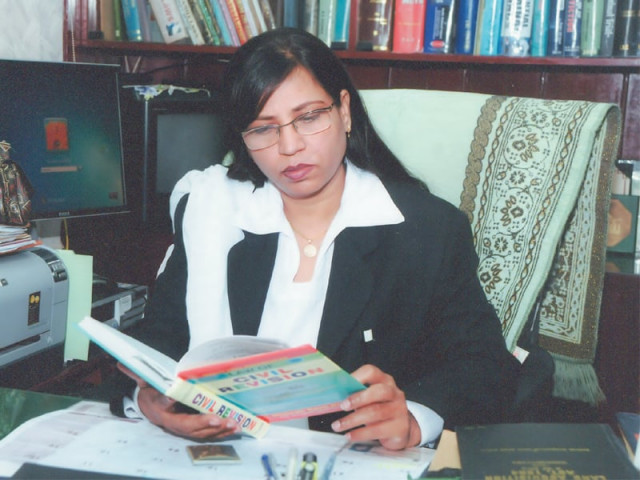
Dr Raana Khan, who completed her doctorate over eight years, received her degree at the 2012 convocation of the Karachi University held in January, 2013, by vice-chancellor, Prof. Dr Muhammad Qaiser. PHOTO: EXPRESS
Almost a decade back, she was prosecuting a case of the woman who was a lone eyewitness to her son’s murder but flawed forensic reports cost Khan the case.
The helplessness to provide the mother justice, over a couple of years, morphed into a passion to achieve what no woman, at least in Pakistan, had before - she decided to pursue a doctorate in forensic investigation in 2005 under the supervision of Sindh Service Tribunal Chairperson Justice (retd) Ghulam Nabi Soomro.
After eight years of arduous efforts, Dr Khan stood proud at the 2012 convocation of the Karachi University held in January this year, when vice-chancellor, Prof. Dr Muhammad Qaiser, awarded her the doctorate degree.
“The case of the woman, though it hit me hard, was not an exception,” noted Dr Khan in an interview with The Express Tribune. “The effectiveness of prosecution, or lack thereof, in Pakistan can be judged by the shockingly low conviction rate, which hovers around 11 per cent as compared to countries like United Kingdom (94%), United States and Australia (85%).”

Forensic investigation plays a vital role in the criminal justice system today but its application in Pakistan is almost nonexistent, she said while sharing her last year’s experience at the International Congress on Contemporary Problem of Law held in Turkey. “The international participants found it hard to believe that a Pakistani woman was talking on the subject of applied forensic science.” Since no legislation has been made as yet for forensic investigations, she intends to create an advocacy forum, comprising experts on the subject, who could mutually consult and prepare a draft bill.
Importance of forensics
While sharing her experience as a practicing lawyer - as a prosecutor and defence counsel in the trial and appellate courts - Dr Khan noted that the reports and opinion of forensic experts directly affect the crime scene reconstruction, especially to form the logical theory of a crime by the investigation officer. Due to the technical gaps created by professional negligence on part of forensic experts and investigating officers, however, the purpose of forensic investigation can be manipulated into helping the guilty get the benefit of the doubt.
Dr Khan recalled a murder case in which the autopsy report of the body was not properly submitted, solely due to the negligence of the medico-legal officer. The difference between time of death and time of bullet injury created doubt that led to acquittal of the culprit. “Whenever a victim failed to get the just verdict from the court, it left a very painful impact on those responsible for the provision of justice.”
For this purpose, she painstakingly detailed the role and responsibilities of all the related forensic experts, investigating officer, prosecutor and the judge, so that fair and impartial murder trials could be conducted -- especially in cases of murder caused by gunshot injuries.
Flaws in the justice system
The criminal justice system can only improve when our investigation agencies collect factual and circumstantial evidences with proper forensic examination before submitting the charge sheet in the court, she said. “If the forensic investigation by the agencies is accurate, only then will a prosecutor be able to fight the state’s case.”
She also shared her observation that most judges who conduct criminal trials are not fully aware about the scope, scientific applications and related terminologies of the scientific forensic investigation. “On the basis of their lack of knowledge, they avoid to adduce the evidence of forensic expert’s reporting and other relevant factors in a proper manner.”
Journey to a PhD in forensic investigation
In absence of research material on forensic criminal investigation, Dr Raana Khan had to travel to multiple countries, including China, Turkey, India and United Arab Emirates. To understand and collect material on new trends and developments in forensic research, she also visited universities in United Kingdom, such as Oxford University, Queen Mary, University of London, and Queen’s University of Belfast.
For a well-balanced research, Dr Khan told The Express Tribune that she held long discussions with sitting and retired judges of superior and lower courts, senior advocates on the criminal side as well as high officials of investigating agencies and forensic experts. Capt Dr Farhat Hussain Mirza, who is the forensic medicine head at Dow University of Health Sciences, said Dr Khan was a huge help on technicalities of autopsy reports.
With no expert available in Pakistan to evaluate her thesis, it was sent to Dr Hakan Hakeri, the dean of law school at Istanbul Medeniyat University in Turkey and Dr Barbara A Rasco, a professor at Washington State University in United States.
Dr Rasco, who greatly admired the Pakistani lawyer’s efforts, suggested that she convert her thesis into a book so that it could offer guidelines to professionals whose practice includes criminal laws, attorneys, judges and anyone else interested in the field.
Dr Khan took up this challenge with dedication and the draft for the book is now ready for publication, under the title Guidelines for Forensic Investigation in Trial of Murder Cases Caused by Gunshot Injuries, which will be available by next month. “Through this book, even a layman can acquire knowledge about the procedure relating to scientific criminal investigation.”
Published in The Express Tribune, April 22nd, 2013.


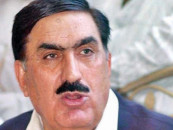
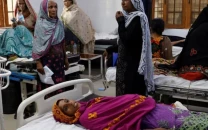

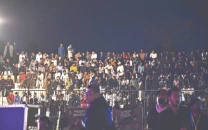
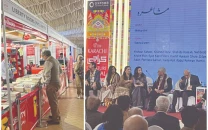











COMMENTS
Comments are moderated and generally will be posted if they are on-topic and not abusive.
For more information, please see our Comments FAQ